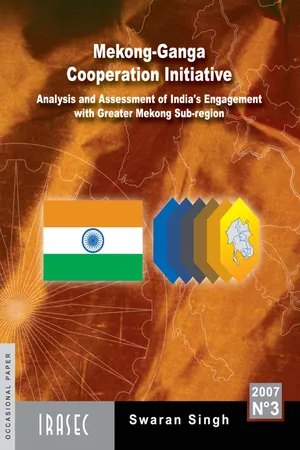
Mekong-Ganga Cooperation Initiative
Analysis and Assessment of India’s Engagement with Greater Mekong Sub-region
- English
- ePUB (mobile friendly)
- Available on iOS & Android
Mekong-Ganga Cooperation Initiative
Analysis and Assessment of India’s Engagement with Greater Mekong Sub-region
About this book
From October 2006, India holds the Chair of the Mekong-Ganga Cooperation Initiative (MGCI). Cambodia and Thailand have held this position for three years each before India, and in that order. MGCI was launched on 10th November 2000 in Vientiane (Laos) and aims at rekindling the cultural links between India and the five riparian states of the Mekong River, namely, Cambodia, Laos, Myanmar, Thailand and Viet Nam. It is from here that India seeks to strengthen connectivity through building the physical and social infrastructure in these countries. This includes roads, rails, air links and information and communication technologies as also education, culture, and imparting skills in development management and other technical areas. It is only with a robust engagement of this nature that MGCI may evolve a lasting socio-political and economic partnership with this region and take it further in enhancing India's military and strategic equations with these countries. India has taken scores of major initiatives under the MGCI and this newfound enthusiasm has also provided a boost to India's bilateral relations with each country. As this study shows, the results, however, remain a mixed bag and India needs to accelerate its footwork to implement its grand vision and to keep pace with other major stakeholders in this region. In particular, progress made by China has been far too rapid and this has put China in the lead and this remains a subject of debate both inside and outside the Mekong region.
Frequently asked questions
- Essential is ideal for learners and professionals who enjoy exploring a wide range of subjects. Access the Essential Library with 800,000+ trusted titles and best-sellers across business, personal growth, and the humanities. Includes unlimited reading time and Standard Read Aloud voice.
- Complete: Perfect for advanced learners and researchers needing full, unrestricted access. Unlock 1.4M+ books across hundreds of subjects, including academic and specialized titles. The Complete Plan also includes advanced features like Premium Read Aloud and Research Assistant.
Please note we cannot support devices running on iOS 13 and Android 7 or earlier. Learn more about using the app.
Information
Table of contents
- Cover
- Bibliographic informations
- First pages
- Table of contents
- About the Author
- Acknowledgements
- Chapter One. The New Context
- Chapter Two. India’s Contacts with GMS
- Chapter Three. MGCI: Genesis and Evolution
- Chapter Four. MGCI: Impact on Bilateral Ties
- Chapter Five. Future Challenges and Prospects
- Conclusion
- Appendix: Core of Connectivity in GMS
- General Bibliography